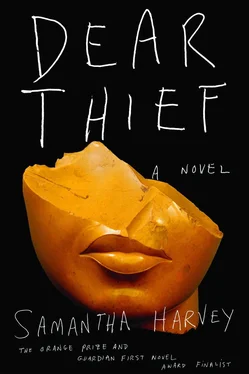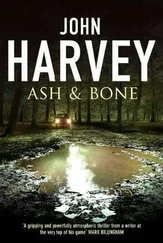‘Like all women,’ he said, ‘you refuse to accept a compliment — why can’t you?’ ‘Why can’t I? — because at school they called me a giraffe.’ He laughed. ‘It must be those two horny growths on your forehead.’ And then he asked, in a voice close to sleep, if I would go pearl-fishing with him one day.
History, of course, knows the answer to this question, it knows the long night-drives up to Scotland and poses the question in hindsight: how many holidays is a woman supposed to endure camping by the Oykel River in a freezing Scottish springtime while her husband looks for pearls? For that matter, how many trips to antique shops hunting out rubies or San Carlos peridot or Baltic amber, combing for jet, bartering at mineral fairs? Will there be a reward for this in the afterlife or has it all been in the name of selflessness? And yet at the time of course the answer rushed to my lips without pause.
He turned our torches out and told me to listen. Could I hear that high-pitched sound, that wailing? I answered no, too deafened by the darkness. It was the thickest, dustiest, most crowded darkness I have ever known. He told me that a year or two before there had been a show, the Royalty Follies , that used dolphins, and the dolphins had lived in a tank in the theatre for weeks. And now they haunted the theatre and could be heard. We lay in calico, velvet and dust, awake and asleep all night, but I didn’t once hear them. I only heard the braking and whistling of underground trains until they stopped for the night and when they started in the morning, and had an awareness of a beautiful intention I now had for my life, the intention to be happy. ‘There!’ Nicolas would whisper once in a while, perhaps into my neck or into my mouth. ‘A dolphin, did you hear it?’ But I never did hear it. I just kept thinking, maybe saying, with a kind of anxious joy: ‘I have a piano, a Bechstein I got for my eighteenth birthday, we could sell that.’
When morning came we had no notion of it. I held the torch up while Nicolas looked in his pockets for a watch. I stared upwards into that band of torchlight and saw dust caught and falling, in exactly the way meteors fall. Each particle of dust left a tail, and seemed to appear from nowhere as a burst of light and then dissolve. I don’t know why it should be that such small things can sometimes take up so much of our attention and imagination, but this dust is one of the sharpest memories I have so far in my life.
I suppose the world is constantly producing things of wonderment, every moment, at every scale, and one time in every million or so our minds will be such that we will be open to seeing it. To see the silver effervescing of that dust was as beautiful a sight as any mountain or waterfall; but then, when I saw it, I was in love and as happy as a human being can be. Of course this helped. The world is heavily changed by the way we perceive it; in all my reticence and doubt, this is one thing even I haven’t been able to dispute.
And you? Content?
No; somewhat less than content. If I think about this desert of yours I see trees rather than sand, but it is a sparse scattering of trees, which are very upright, pines or birches, and in the middle a house, or more likely a hut. In this hut a table with a single chair and a bed, in fact the charpoy my parents brought back from India for you, but the base has holes in it where the ropes have come unknotted. Here you lie at your maximum discomfort without a mattress and with your legs falling off the end; charpoys were not made for your Eastern European stock — nevertheless you do have a pile of blankets, not particularly soft, but thick and heavy enough to keep you warm. Under the charpoy on the floor are your clothes, a pair of shoes and a pair of boots. In this spare and functional scene your womanliness lives in one single object — the fine, soft shawl over the back of the chair, ingrained with years of perfume and pulled shapeless where you have worked your fingers through the crochet.
There are also a small number of books and a solid-fuel stove and, let me see, a sandwich toaster. My imagination grants you electricity. If you are to have electricity then there is also an overhead bulb and a pump to supply water from the spring and — no, the luxury must stop there. On the whole you have a towering nonchalance about food and also the suspicion you reserve for everything that tells you you need it; but even so it is amazing what you’ve been able to make in that sandwich toaster. Toasted honey sandwiches are the supper staple and you also find that sliced apple and honey works, as does pear, and if those fruits, then why not vegetables — you boil them first on top of the stove and there it is: toasted carrot-and-swede sandwiches, or beetroot-and-cabbage, and potato dumplings; you’ve toasted a piece of gammon, smoked sausage, eel, and sometimes you’ve dispensed with the bread and clinched a filleted perch or herring between the ridged grills and eaten it off the hotplate. Who needs an oven? you mutter with a cigarette between your lips.
What is around you? Nothing. I see no neighbours or even a lake that would give the wilderness meaning, I just see these scattered trees for an indefinite distance. Early in the morning you come out of your hut and stretch. You collect pine needles from the ground to make a mulch for growing vegetables on the nine-feet-square plot you’ve dug over behind the hut, where you have some potatoes, carrots, mint, beans and peas, that sort of thing. Beetroot that keeps going into October, swedes into January. You grow them without gusto and with the almost reproachful lack of fuss that makes everything and everyone want to do its best for you, to be the one thing to hook your attention.
I suspect you walk for some part of the day out in the maze of trees and drop cigarette butts to guide your way back. By and large, though, you sit at the table and study the Upanishads. You appraise every word of them, each abstruse, unwavering and rousing word. Book II of the Taittiriya Upanishad, the book of joy: Man’s elemental Self comes from food: this his head; this his right arm; this his left arm; this his heart; these legs his foundation. You get up and pace. Food gives rise to the Self? Food gives rise to the Self ? The Self — Atman — is in food, and rises from food to vegetation to earth to water to air to Spirit to Brahman. Atman and Brahman are in the eel pressed indecorously between two pieces of stale bread! In the lowest things the glow of universal Spirit — but wait, the elemental Self, the living Self, the thinking Self. Legs are the elemental Self, but is the head, the brain, the mind? Is the mind elemental or living or thinking? They who think of food as Spirit shall never lack. Shall never lack! Brahman in the eel, the smeared pork grease, the beetroot!
Often, these little revelations. They give you a radiant smile. You proceed at one page a day, if lucky, and when you have finished the ten books you start again, Book I, The Lord: This is perfect. This is perfect. Perfect comes from perfect. At one time you’ll close your eyes, sit back and hook your hands over the ridges of your hips in pure pleasure at those opening words; at another time you’ll flatten your hand across the page in undiluted fury. What is perfect? Nothing is perfect! This is pompous. This is pompous. Pompous comes from pompous. Maybe you’ll throw the whole volume on the fire like you do the other books you hate, except its lies would probably put the fire out.
Later you will deride yourself for your lack of cultivation after all this time and for the way you live like an animal, or less than an animal, because at least animals mate and stay busy. You — you are just killing time on Earth before you can be allowed to die. On the loneliest or most self-denying of days you will try to affirm yourself again by writing a postcard to the one person on Earth you find simple enough to love. Dear Teddy, I’m well and still living in the desert, you’ll say.
Читать дальше












